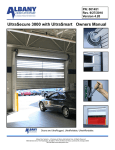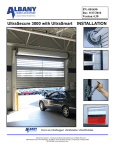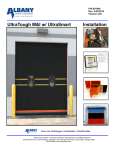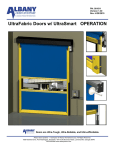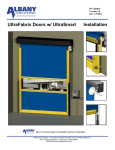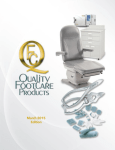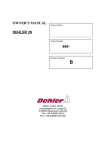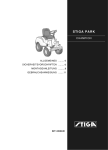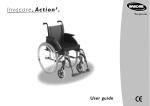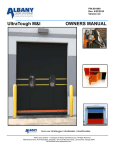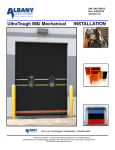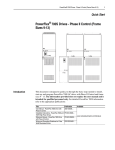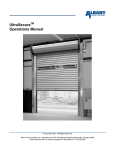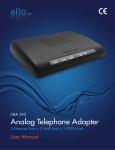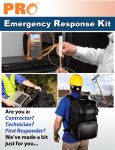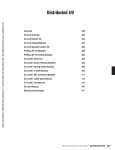Download UltraSecure Owner`s Manual
Transcript
PN: 001451 Rev. 11/29/2011 Version 4.3 UltraSecure 3000 with UltraSmart Owners Manual Doors are UltraRugged, UltraReliable, UltraAffordable. Albany Door Systems - A Company of Albany International Corp. All Rights Reserved 975-A Old Norcross Road, Lawrenceville, Georgia 30046 800-252-2691 www.albanydoors.com TABLE OF CONTENTS Introduction 3 Product Description 4 Drawings 7 Inspection Plan 9 Safety Instructions 12 Troubleshooting 14 Maintenance 15 UltraSmart Control Pan- 17 Wiring 25 Wireless Safety System 31 UltraSmart Startup Procedure 32 Parts Diagram 37 ALBANY DOOR SYSTEMS CONTACT INFORMATION 945-A Old Norcross Road, Lawrenceville, GA 30046 Phone: 800-252-2691 Fax: 770-338-5024 Technical Support & Aftermarket Parts: Phone: 877-925-2468 Fax: 770-338-5034 www.albanydoors.com / [email protected] 1 Manual #001451 Version 4.3 High Speed Doors Operation INTRODUCTION The contents of this manual are designed to help you operate and maintain Albany UltraLite™, UltraFast™, UltraCool™, and UltraFreeze™ high speed doors. DO NOT operate or perform maintenance on the high speed door unless you have read through the instructions in this manual. The safety alert symbol is used to identify safety information about hazards that can result in personal injury. A signal word (DANGER, WARNING, or CAUTION) is used with the safety alert symbol to indicate the likelihood and the potential severity of injury. In addition, a hazard symbol may be used to represent the type of hazard. DANGER indicates a hazard that, if not avoided, will result in death or serious injury. WARNING indicates a hazard that, if not avoided, could result in death or serious injury. CAUTION indicates a hazard that, if not avoided, might result in minor or moderate injury. CAUTION, when used without the alert symbol, indicates a situation that could result in damage to the door. NOTICE is used to inform you of a method, reference, or procedure that could assist with specific operations or procedures. Other symbols that may be used in this manual are: Lock Out / Tag Out Rev. 11/29/2011 Crushing Fire Manual #001451 Shock Read Manual 2 Product Description Principle The UltraSecure 3000 is a vertically opening high-speed rolling metal door primarily for external use. The door panel is made of aluminum slats connected to a special belt. The slats wind on up to three variable sized disc modules. They do not stack or wind onto each other, which protects the slats from excessive wear and produces smooth, contact-free frictionless operation that allows for the high opening speed. Absorbing profiles attached to the perimeter of the discs enables quiet operation and dampen vibration of the slats during winding. The flat belt functions as a pulling device. Hinges and rollers are not necessary in this door system, allowing for longer maintenance intervals and increased door life. Rubber connections between each slat prevent moisture from entering and from settling between the slats. The pulling power is transferred equally to the disc modules by a gear motor via a drive shaft. This is also supported by tensioned springs located within the side columns. The door closes with assistance from the weight of the panel. The panel moves vertically within special guide rails located in the side frames. The door may be opened manually in the event of a power outage by releasing the brake via the side column mounted egress lever. The UltraSecure 3000 is equipped with a wireless electric reversing edge and inline safety light curtain photo eyes.. Slats The slats of the Rapid Roll 3000 are double walled extruded anodized aluminum with rubber seals in between. Each slat is individually connected and can be easily removed and replaced. Window slats are available as an option. Side Frame The side frames and cross sections of the Rapid Roll 3000 are galvanized steel. The various elements of the side frames come pre-assembled from the manufacturer. During installation, the side frames must first be set up and fastened to the wall / floor in the upper and lower area. The upper width gauge can help define the exact distance of the side frames. After the side frames have been secured to the wall, the pre-assembled top roll with the rolled-up door panel must be placed onto the top of the side frames and secured. 3 Manual #001451 Version 4.3 High Speed Doors Operation Control Unit The UltraSecure 3000 is operated by a frequency converter control unit, which enables smooth acceleration and deceleration of the door. The maximum opening speed is 80 in/sec depending on door size. The door’s closing speed is approximately 24 in/sec. Manual Operation During maintenance work, or in the event of a power outage, the door may be opened manually by releasing the brake via the side column mounted egress lever. The door opens partly by itself after the brake is released, and may be opened further by manually pushing the door panel upwards. Electric Safety Devices The door is equipped with various safety devices, which are partly based on radio – photocell systems. Electric safety features The UltraSecure door utilizes a minimum of two safety features. This is comprised of safety photocells and electric reversing edge. Self-monitoring Drive Unit The temperature of the drive unit is regulated by a thermal switch, which disrupts the power supply of the drive unit upon overheating. Testing the Safety Systems Before each downward movement an internal “self-testing” of the photocells and the control unit is made automatically (Safety classification 2 according DIN EN 954-1 "Safety relevant parts of control units"). If a fault is detected, disruption of the power supply to the control unit occurs immediately. The safety switches work as a closing unit and are in continuous operation. Additional Safety Systems Depending on the kind of application it may be advisable to utilize additional sensors for safety reasons. This will be especially valid for doors with frequent pedestrian traffic or doors less than 10 feet high due to limited optical awareness of a closing door by the user. Albany Door Systems offers various additional safety systems for fast running doors such as; motion sensing detectors, floor loops, etc. We suggest individual consultation with an Albany Door Systems’ representative at the application site . Rev. 11/29/2011 Manual #001451 4 Mechanical Safety Devices Springs are situated in separate chambers serving as a weight balancing system. The springs are enclosed and protected by metal covers. The door has a multi independent weight balancing system. Disengagement of the drive unit brake will not lead to a sudden drop of the door panel. For doors with a height less than 8 feet a top roll cover is absolutely necessary according to valid regulations. Drive Unit An electric drive unit operates the UltraSecure 3000. The drive unit is installed in the upper area of the door, not within reach from the floor, and has a vibration dampening attachment. The drive unit may be positioned on either the left or right hand side, according to customer requirements. The same drive is used for all varieties of door height. The frequency converter control unit will be operable with various parameters depending on the size of the door. The door may only be operated with an original drive and control unit made by the manufacturer of the door. Technical Data Door principle: Running direction: Application: Available sizes: Max. opening speed: Closing speed: Application: Drive: Connecting voltage: Motor performance: Control unit: Control voltage: Motor protection: Side frame: Door curtain: Pulling device: Sound pressure level: Wind resistance: Door measurements and installation space: 5 rolling metal vertical fast running exterior (primarily) or interior W min.: 2.58 ft (1250mm) W max.: 16.4 ft (5000mm) H min.: 6.50 ft (2500mm) H max.: 16.4 ft (5000mm) Height steps: 1/2 inch (125mm) 80”per sec (2.5 m/s) approx. 24”per sec (0.7 m/s) inner side of exterior wall electric 3/(N)/PE 230/400 V ±10%, 50/60 Hz 1.1 kW UltraSmart Control (frequency converter control unit) 24 V DC IP55 galvanized steel double walled anodized aluminum flat belt with integrated steel ropes 70 dB A 110 m/h, classification 3 (EN 12424) see enclosed drawing Fixing points: see enclosed fixing point plan Technical changes to the door and the manual can occur. If you have questions please consult with the factory. Manual #001451 Version 4.3 High Speed Doors Operation UltraSecure 3000 10’ high up to 16’ high Rev. 11/29/2011 Manual #001451 6 UltraSecure 3000 up to 10’ high 7 Manual #001451 Version 4.3 High Speed Doors Operation Inspection Plan Observe the safety notices within the operation manual. Power to the door must be shut off prior to inspection of any door component. Installation fixings Before checking the following mentioned components the cover in front of the spring housing and eventually the existing top roll and motor cover must be dismantled. Drive unit Check retainer of the torque support and buffer. Check function of brake release lever. Check self-opening/manual opening/egress Drive shaft Check flange bearing retainers of drive shaft. Check retainer of the spiral disk on the shaft. Check condition of sound isolation or black dampener profiles on the spiral disks. Exchange of flat lifting belts. Door leaf Check surface of lamellas/slats for grinding and signs of damages. Check exact position of lamella sealing. Check fixing of lamellas on pulling device. Check solid position of lamella adapter/endplates. Guiding rails Check for wear and tear on guidingrails, especially in the area of funnel (<4MM) Side columns and lintel profile Check fixing and condition of the profiles as well as fixing at the wall Check condition and fixing of trailing chain for cable if equipped Check condition and installation of springs and spring fixing. Check leaf tensioning system if equipped. Exchange rubber cable/bungee cord if equipped Clean optic of photocells. Counter balance system Exchange springs H<3m. Exchange springs H>=3m. Check condition and fixing of the spring belts. Lubrication of roller chain (only RR3000R). Control Box and additional components (like safeties & actuators) Check completeness of wiring diagram. Check main switch/CEE-plug and control box lock. Check fixing of control panel Check function of staionary and/or pre-runing photocells Verify stopping position of limits Check function of electric reversing edge if equipped Rev. 11/29/2011 Manual #001451 Annually or 100,000 cycles. Annually or 100,000 cycles. Annually or 100,000 cycles. Annually or 100,000 cycles. Annually or 100,000 cycles. Annually or 100,000 cycles. Annually or 100,000 cycles. 500,000 cycles. Annually or 100,000 cycles. Annually or 100,000 cycles. Annually or 100,000 cycles. Annually or 100,000 cycles. Annually or 100,000 cycles. Annually or 100,000 cycles. Annually or 100,000 cycles. Annually or 100,000 cycles. Annually or 100,000 cycles. 500,000 cycles. As necessary. 500,000 cycles. 250,000 cycles. Annually or 100,000 cycles. Annually or 100,000 cycles. Annually Annually Annually Every 6 months or 25,000 cycles Annually or 50,000 cycles. Every 6 months or 25,000 cycles 8 Safety Instructions Area of Application and Classified Use Unless explicitly described otherwise, Albany Door Systems’ doors are developed and tested for use under normal operating conditions. For an application with special conditions (for example; onesided permanent load with temperatures, excessive pressure or special environmental conditions, etc.) contact Albany Door Systems. The door is defined primarily for use in industrial buildings. As an exterior door with respective resistance against wind pressure and weather conditions it opens with a speed especially suited for high frequency vehicular traffic ensuring a smooth transport flow. The door may also be applied as an interior door. Duty of Care The door has been designed and manufactured under consideration of a risk analysis according careful selection of valid norms and further technical specifications. The system meets status of technique and ensures the highest level of safety. All necessary measures and precautions must be observed in order to achieve the high safety standard. It is the duty of the door operator to plan the respective measures and check the door’s performance. Please read the user manual carefully and keep it in a safe place for future use. The operator is liable to ensure that: Installation, initial operation, inspection, maintenance, repair work and dismantling are made only by manufacturer personnel or manufacturer trained and qualified personnel. Only sufficiently trained, qualified and authorized personnel should operate the door system. The door is to be used only in accordance with the classified purpose (see above). The door is to be operated only in a perfectly functioning state and that the safety features are regularly checked for orderly operation. The user manual is kept at the site of the door for future use and is in readable condition at all times. The operating personnel are continuously trained with regard to working safety and operating instructions and especially the herein-contained safety instructions. All safety and caution notices affixed to the door will not be removed and are kept in readable condition. 9 Manual #001451 Version 4.3 High Speed Doors Operation General Safety Advice Please read the user manual carefully and keep it easily accessible for future use. Always follow the safety instructions mentioned in the user manual. Do not use this door for purposes it is not intended for. This user manual must also be transferred upon the transfer of this door to third parties. The use of the emergency lever may lead to a partial self-opening or closing of the door. The door panel may be opened upon failure of the electrical drive by disconnecting the brake using the emergency disconnect lever. Do not put your hands on the side frames of the door during operation. Lingering of persons in the working area of the door should be avoided. Existing man doors should be used for pedestrian traffic. Should it be necessary for pedestrians to utilize the door opening, they should walk through at a normal pace. Keep the immediate area of the door free of debris or refuse, which could cause accidents. Do not climb on the door. The power to the door must be shut off at the main switch and must be secured against returning to the “on” position prior to working on the door. Upon damage to the door (mechanical or electrical), the power must immediately be turned off. This is especially valid when damage has occurred to the electrical cables or wiring. The door must only be operated within the parameters of the defined voltage or net frequency. Use only equipment or additional features which are authorized by the manufacturer of the door. Operating the door during excessive wind pressures may be dangerous. Safety instructions must be observed without exception, not only the general safety instructions but also the special notices mentioned in other chapters of the manual Additional Advise Please call 800-252-2691 for further information about this product or about Albany Door Systems’ complete product line. Rev. 11/29/2011 Manual #001451 10 Troubleshooting To avoid damage to the door or injury to personnel during repair of malfunctions or errors, the following instructions should be carefully observed: Only trained personnel should accomplish Work. Turn off the power at the main switch prior to performing any work. Secure the main switch against being turned on again by locking it or by having a second person present. Secure the door’s operating area. Read "Safety Instructions". In the event the repair cannot be made or assistance is required, please contact the customer service department of the supplier or manufacturer of the door. Mechanical Malfunctions Malfunction Door opens independently Manual opening not possible Drive not functioning Curtain unwraps 11 Possible Causes Necessary Measures Brake at the drive defective Replace the brake Brake incorrectly adjusted Adjust the brake Counterbalance is oversized Call customer service Counterbalance defective Replace the counterbalance device Bowden cable hanging off or too loose Check correct position and tension of the bowden cable Brake blocking Call customer service Power supply is off Connect the door to the power Electrical connections defective Check electrical connections Safety device is defective Replace the safety device Door not correctly installed Call customer service An object was rolled up Close the door and check for enclosed object Manual #001451 Version 4.3 High Speed Doors Operation Electrical Malfunctions For repair of electrical malfunctions see the error code manual at the appendix of the user manual instructions. Malfunction Possible Causes Door not functioning Door does not close Door closes only with next impulse Necessary Measures Power supply is off Check power supply and fuse Safety device damaged Check control unit and replace the fuse Main switch off Turn (main switch) switch on Stop-circuit interrupted Check stop circuit. Unused stop inputs must be bridged in accordance with the circuit diagram. Up impulse permanently activated Test impulse actuator Photocell interrupted or disconnected Test safety devices Toggle circuit adjusted Check adjusted control function Maintenance Customer Service In the event maintenance or repair is required, please contact the supplier or the manufacturer of the door. Albany Door Systems 975-A Old Norcross Rd Lawrenceville, GA 30046 Main Telephone: 800-252-2691 Customer Service Telephone: 877-925-2468 Service & Parts Fax: 770-338-5034 Rev. 11/29/2011 Manual #001451 12 Inspection and Maintenance Maintenance and inspection work must only be performed by manufacturer trained authorized personnel. Before beginning the above-mentioned work the power must be disconnected by turning off the main power switch and locking it. The control unit must be checked to determine there is no power to it with the appropriate device. All ladders, scaffoldings, or similarly used equipment should correspond with valid safety regulations. The area around the door must be blocked for traffic. Any spilled lubricating oil, tools and other material should be removed from the floor when work has been completed. The necessary intervals, check-ups and instructions for such work are documented in the “Inspection Schedule“ (see Appendix). Cleaning Cleaning and Maintenance of the Panel Do not use any glass cleansing liquids (contents may be corrosive) Never use score cleansers, scrapers, razor blades, spatulas, etc. Clean with warm water, a small dose of mild plastic cleanser and a soft cloth. Cleaning and Maintenance of the Side Frame Dust may be removed with a soft cloth. Harder dirt may be removed with water and general liquid cleanser. Grease or oil on the metal surfaces may be removed with solvent containing cleanser. Do not use a high-pressure cleaning machine. Clean Door Area The floor around the side frames may become dirty with lubricants, etc. following maintenance work. This must be removed quickly. Tensioning the Panel The door is furnished with a panel tension system. The bottom profile is pulled down on both sides by means of a rope. The ropes guard a secure run during closing of the door especially during heavy wind force. 13 Manual #001451 Version 4.3 UltraSmart Control Panel High Speed Doors Operation Controls This key pad opens the door at a slower speed than normal door operation. The door will open as long as the key pad is pushed. This key pad closes the door at a slower speed than normal door operation. The door will close as long as the key pad is pushed. This key pad sets the time delay of the door closing once it has reached the selected open position in manual mode. Figure 1 Control Panel Key This key pad sets the time delay of the door closing once it has reached the selected open position in automatic mode. Display: The display shows operation, functions and error codes of the door operation. It is also used when setting adjustments. This key pad resets error codes, holding it for five (5) seconds will enter the menu. This button is also used while in the program mode to leave the present level and return to the previous program level, or exit the program mode. This key pad opens the door and stops the delay timer from closing the door. This key pad stops the opening or closing of the door. This key pad closes the door and stops the delay timer. Rev. 11/29/2011 This key pad is used to select menu options while in the program mode. This key pad scrolls up in the menu, or increases a setting value. This key pad scrolls down in the menu, or decreases a setting value. Manual #001451 14 Control Panel Display The display on the front of the control panel shows two lines of information. The top line displays system status and the second line displays details of the function or specifics of errors. Normal Operation During startup the display will show the software version programmed into the control panel and whether or not the door is ready for normal operation. Once the software has booted the door is ready for operation, the top line will display “Door Ready” unless there is an error detected. During normal operation the top line will display the current door status, with respect to movement or timers. “Door Ready” will be displayed while in standby mode, if no errors are present. The second line on the display will show the activator name for the function, or the safety device that triggered an action. The activator can be a manual input signal from the light curtain or reversing edge, or a breakaway switch input. There can be normal operation with the top line displaying “Door Ready” and the display second line showing a warning. The “Open: Delay timer Active” display is shown when the door is open and a timer function is operating to delay the door from closing. A “Preventer” code may be displayed if a condition exists to prevent the door from closing such as a disruption of the light curtain or a door bottom edge breakaway. The timer is re-armed if a “Preventer” condition exists. If any of the warnings shown on page six (6) except for “RevEdge Was Tripped” is displayed, please contact Albany Door Systems for diagnosis and repair. If the bottom line displays “RevEdge Was Tripped” it indicates that the door is open due to a reversing edge trip during the previous close cycle. The diagram show on page six (6) shows examples of normal operation displays. Operator Service Changing the Door Closing Time Delay In normal operation the Auto time delay selects the delay time before closing the door once it has reached the selected open position. To increase the time that the door waits before closing: Press the time delay will be displayed in seconds at a flashing cursor. If no key pad is pressed the controller will automatically return to normal operation after approximately four (4) seconds. Press the or to change the time delay in second intervals. After four (4) seconds the display will return to normal operation and the time will be stored in memory. If the time is set to “00” with the Man 1 Close Delay the door will remain open until this activator is triggered. Seating the Door in the Tracks This function is not applicable for the UltraSecure door. Breakaway upon impact is not possible. 15 Manual #001451 Version 4.3 High Speed Doors Operation Line One (1) Text Line Two (2) Text Startup: R-Bac Industries Door Not Ready Normal Operation: Door ready Opening: Opening — Full Opening — Part Open: Delay Timer Active Auto1 Close Delay Auto2 Close Delay Man1 Close Delay Man2 Close Delay DTC Timer Open Commanded :Delay Timer Active: DTO Timer (Display shown during a count - down of the timer.) Closing: Closing Normal: Warning Door Ready Startup: Version n.m Normal Operation: 0000000 The zeros indicate the number of door operations. The counter will advance with each full or partial door opening. Version n.m (shown until first cycle) Opening: Auto 1 Auto 2 Man 1 Man 2 Open Pb Open On Panel Photo 1 (Front) Photo 2 (Rear) Reversing Edge Breakaway Open: Delay Timer Active: (Preventer, if any) Open Commanded :Delay Timer Active: Closing: Auto 1 Auto 2 Man 1 Man 2 Close Pb Close on Panel Normal: Warning Encoder Low Battery Module D Loop Open Module D Loop Short Module D Loop Error Module D Loop1 Open Module D Loop1 Short Module D Loop1 Error Module D Loop2 Open Module D Loop2 Short Module D Loop2 Error RevEdge Was Tripped Rev. 11/29/2011 Manual #001451 16 Adjustments Door Limit Adjustments Door limit adjustments are used to set four heights that the door opens and closes to. There are four (4) heights that the operator can set; Closed Limit, Full Open Limit, Partial Open Limit, and Break Away Reset Limit. The Closed Limit should always be checked for correct height or set before the other limits are set. When any limit is set all of the limits should be checked or set. Closed Limit Used to set the fully closed position of the door. The door controller uses this position as the “zero” position to establish the height that the door moves to for two (2) open positions and the break away position. The Open, Partial, and Break Away limits are all relative to the Closed Limit. If the closed limit is reset to a different position, all the other settings will change relative to the new Closed Limit Setting. Full Open Limit Used to set the height that the door opens fully to. Partial Open Limit Used to set the height that the door opens to if it is programmed for a lower opening in addition to the fully open position. 17 Manual #001451 Version 4.3 High Speed Doors Operation Periodic Maintenance Continued… Quarterly Inspection 1. Perform daily inspection. 2. Check all mounting hardware and verify that all nuts and bolts are tight. Hardware includes: wall anchors, cover hardware, motor mounting hardware, and bearing bolt nuts. 3. Check the break away function by performing the following steps: Stop the door so the bottom rail is between waist and chest high. Push the bottom bar out of one of the side columns. Press the open key pad and verify that the door opens to the break away opening height and that the bottom bar centers in the side rails. Press the close key pad and verify that the bottom rail is centered and the door closes fully. 4. Inspect all side and top weather seals for wear or damage. Troubleshooting DISPLAY OR DOOR Problem Possible Cause Corrective Action No control or VFD display. Loss of main power. Check with meter across L1-L2,L2-L3,L1-L3 Blown Fuse Check with Meter: Across 1L1-1L2, 1L2-1L3,1L1-1L3 Across 2L1-2L2, 2L2-2L3, 2L1-2L3 Loss of power. Check with meter across 1L1-1L2 at control transformer. Blown fuse. Use meter to check for 24V between wired H_ terminals on top of transformer and between XF and X2 on bottom of transformer. No display or LED’s light on module panel. E stop jumper loose or miss- Verify that jumper is between 1A and 1B on ing. terminal strip of module board. Door will not open. Rev. 11/29/2011 If E stop button present. Check to see if E stop button activated. No input signal at module A Check activation input by pressing corresponding test button, LED should light and door open. If door opens: faulty activator or wiring to module. If door does not open by test button: faulty module. Manual #001451 18 Trouble Shooting Continued... DISPLAY OR DOOR Problem Possible Cause Corrective Action Door does not close. Held open by safety input or ac- Check display readout. Check tivator input. for lit LED on modules A and B. Remove corresponding wire on module A. For lit LED-if door closes: faulty activator. If LED stays lit and door stays open: faulty module. Held open if loop installed. Check loop module for lit LED. Remove loop wires from module terminal strip. If door closes: faulty loop wire. If door remains open and LED stays lit after removal of loop wires: faulty module. Door does not open or close. Reversing edge activated. Check display reset. Check for bad wire connection. Check that edge is not pinched. Breakaway activated. Check display reset. Check for bad wire connection. Check that edge is not pinched. Brake not disengaging. Check power at terminals 5 and 6 below module C for 24 VAC. Check power at terminals B1 and B2 for 3 phase power. No encoder change, no position Door jammed: clear jam change. Broken drive shaft. Call manufacturer. Encoder com loss of signal. 19 Manual #001451 Check for loose connections or broken cable. Check for encoder mounting. Call manufacturer. Version 4.3 High Speed Doors Operation Trouble Shooting Continued... Light Curtain Problem Possible Cause Corrective Action Red alarm LED on. Transmitter disabled no synchronization signal. Check power supply and cable green LED should be on at all times. Yellow LED flashing. Sever electrical interference. Remove cables from high voltage. High ambient light. Check and adjust alignment of transmitter and receiver. Yellow LED always off. Receiver cannot see transmitter. Remove obstruction. No green LED. Loss of 24 VDC Check across terminal 1 and 4 on module B: Remove wires from terminal 1, 2, 3, 4. If 24 VDC present at terminal 1 and 4: isolate faulty light curtain. If 24 VDC not present at terminal 1 and 4 after removal of wires: faulty module. Motor Drive Fault To clear a fault press the stop key, or cycle power. Problem Possible Cause Corrective Action Motor drive fault F3 power loss. Check incoming power. F4 undervoltage. Check incoming power for low voltage or power interruptions. F5 overvoltage Check for incoming power. F6 motor stalled. Increase accel time or reduce load so drive does not exceed set current in A089. F8 heatsink overheat. Check for blocked or dirty heat sink fins, check fan. F13 ground fault. Check the motor and external wiring for the drive output terminals for a grounded condition. Rev. 11/29/2011 Manual #001451 20 Trouble Shooting Continued... Motor Drive Fault Problem Possible Cause Corrective Action Motor Drive Fault F38 phase U to ground. F39 phase V to ground. Check wiring between drive and motor. Check motor grounded phase. Contact manufacturer. F40 phase W to ground. F41 phase UV short. F42 phase UW short. F43 phase VW short. F70 power unit. 21 Manual #001451 Check the motor and drive output terminal wiring for shorted condition. Contact manufacturer. Recycle power. If fault does not clear, call manufacturer. Version 4.3 High Speed Doors Operation WIRE STRIP GAUGE MOTOR WIRING ¼” 8" 6" ¾” MOTOR WIRE CONDUIT BRAKE WIRES DRILL ONLY INTO BOTTOM OF BOX USE MINIMUM ¾” CONDUIT ¼” T2 MG T1 SEPARATE FOIL SHIELD MG SEPARATE FOIL SHIELD 6" T3 B1 MG B2 NOTE: MOTOR WIRES TO CHANGE DIRECTION OF MOTOR ROTATION – SWITCH T1 AND T2 ENCODER WIRING WIRE STRIP GAUGE ¼” ¾” LOW VOLTAGE CONDUIT ENCODER, SAFETY, ACTIVATION 4" DRILL ONLY INTO BOTTOM OF BOX USE MINIMUM ¾” CONDUIT TB2 TB3 TB1 TB1 TB4 Rev. 11/29/2011 Manual #001451 22 ACTIVATION WIRING N TOP 3 TERMINALS H NEXT 5 TERMINALS MANUAL ACTIVATORS MODULE - A TB2 1 2 3 4 5 CONNECT AS “NORMALLY OPEN” 6 H MODULE - A TB3 HERKULES™ MOTION SENSOR H BROWN GREEN N WHITE PINK Connect GRAY for Person Detection 1 2 3 4 5 6 GRAY RED Connect RED for Vehicle Detection MODULE - A TB3 FALCON™ MOTION SENSOR H 1 2 3 4 5 6 GREEN RED WHITE N BLACK REMOTE CONTROL H H N MODULE - A TB2 1 GRAY 2 3 4 5 6 GRAY RED BLACK TB3 1 2 TB4 3 4 5 MODULE - D 6 LOOP DETECTOR (optional) 23 Manual #001451 Version 4.3 High Speed Doors Operation Rev. 11/29/2011 Manual #001451 24 25 Manual #001451 Version 4.3 High Speed Doors Operation Rev. 11/29/2011 Manual #001451 26 27 Manual #001451 Version 4.3 High Speed Doors Operation ENABLING THE WIRELESS SAFETY SYSTEM If the door is equipped with Albany’s Wireless Safety System (indicated by the lack of a coil cord), the following steps must be taken to initialize the communications: 1. 2. 3. 4. 5. 6. Locate the RF transceiver on the bottom slat (shown to left) Remove the cover and locate the RFID number on the pull strip. Setup the UltraSmart™ Controller according to the procedure below: Hold the circuit board with one hand and pull out the strip. Replace the cover and 4 screws. Test the system. UltraSmart™ Controller Settings Press and hold until “LIMIT SETUP” is shown on the display Press until “WIRELESS SETUP” is shown; Press Press until “BOTTOM BAR ID” is shown; Press Change the number to the RFID number on the bottom bar label using Press to store the value and press and until “DOOR READY” is displayed Thoroughly test the system to determine if all sensors/switches are functioning properly. Make sure you can answer “yes” to the following questions: Does the door reverse when the reversing edge is tripped upon closing? If you cannot answer “yes” to all the above questions, check all wiring connections and ensure the RFID is set to the same number that is labeled on the wireless bottom bar module. Rev. 11/29/2011 Manual #001451 28 UltraSmart™ STARTUP PROCEDURE Albany’s UltraSmart™ control system is designed to accommodate numerous option modules and future technological advances. This manual will address necessary settings for the standard options; however, optional modules and special applications may require additional steps to be taken for proper setup. Refer to the control schematic shipped inside the panel enclosure for additional electrical and setup details. SETTING DOOR LIMITS NOTE: SAFETY DEVICES WILL PREVENT THE DOOR FROM CLOSING IF ACTIVATED DURING SETUP ENABLE THE WIRELESS SYSTEM (IF EQUIPPED) PRIOR TO SETTING DOOR LIMITS 1) Press and hold until “LIMIT SETUP” is shown on the display; Press 2) “CLOSED LIMIT” should be displayed; Press 3) Use 4) Press 5) Use 6) Press 7) Use and/or to bring the door to the full closed position; Press “FULL OPEN LIMIT” should be displayed; Press and/or to bring the door to the full open position; Press “PARTIAL OPEN LIMIT” should be displayed; Press and/or to bring the door to the partial open position or set the same as the full open position if not used; Press 8) Press 29 until “DOOR READY” is displayed Manual #001451 Version 4.3 High Speed Doors Operation The Open and Partial Limits are all relative to the Closed Limit. If the Closed Limit is reset to a different position, all other limit settings will change relative to the new Closed Limit setting. SETTING SYSTEM OPTIONS 1) Press and hold 2) Press Use until “LIMIT SETUP” is shown on the display; Press until “SYSTEM OPTIONS” is shown; Press and/or to cycle through the available options; Press and/or to change the value; Press to edit that option. Use 3) When finished—press to store that value until “DOOR READY” is displayed SETTING TIMERS 1) Press and hold 2) Press Use until “LIMIT SETUP” is shown on the display; Press until “SET TIMERS” is shown; Press and/or to cycle through the available options; Press and/or to change the value; Press to edit an option. Use 3) When finished—press Rev. 11/29/2011 to store that value until “DOOR READY” is displayed Manual #001451 30 Instructions for Using Over-Travel Brake System. About the Over-Travel Brake System Your UltraSecure door is fitted with an over-travel brake system to stop your door in a controlled manner in the event a condition should arise leading to the door traveling past its upper limits. The system terminates the open command and immediately engages the gear motor brake. But, due to the high rotational inertia of the barrel, an additional mechanical brake is utilized, catching the bottom slat for a controlled deceleration. This addendum shows how to reset the system to get your door operational. Prior to resetting the brake, you must lower the door to the open position. Follow electrical instructions for lowering process. Notice: Inspect the door for damage prior to putting it back in service. Repair door where necessary. Failure to perform inspections and repairs can lead to personal injury, property damage or death. If an over-travel event occurs, hooks mounted on the bottom slat engage the brake yoke. The yoke is then dragged through the pair of brake clamps finally coming to rest at the end of the clamp (fig 2.). Fig 2. Safety brake deployed. 31 Manual #001451 Version 4.3 High Speed Doors Operation Resetting the Brake To reset the brake, first loosen the clamp screws (Fig 3) so that you can move the yoke up and down easily. Clamp Fig 3. Move the yoke to the bottom of the clamp and retighten clamp Fig 4. Yoke at bottom position. Rotate yoke rest to a horizontal position and snap yoke into pocket. Reset door limits. Your door is now ready to go back into service. Rev. 11/29/2011 Manual #001451 32 Electrical Operation Instructions When the over-travel mechanism has been engaged, the power to the control system will be disabled. The following procedure will reset the electrical system: 1. Turn the power off (wait 20 seconds) and then back on using the main panel disconnect switch. 2. With the power on, open the control panel and locate the over-travel sensor relay (shown here with teal override button). 3. Press and hold the teal override switch on the sensor relay and jog the door down using the “Emergency Jog Down” button on the face of the C-Module. 4. Once the door has been lowered below the normal open position, stop. 5. Reset the door limits as follows: 1) Press and hold until “LIMIT SETUP” is shown on the display; Press 2) “CLOSED LIMIT” should be displayed; Press 3) Use 4) Press 5) Use 6) Press 7) Use and/or to bring the door to the full closed position; Press “FULL OPEN LIMIT” should be displayed; Press and/or to bring the door to the full open position; Press “PARTIAL OPEN LIMIT” should be displayed; Press and/or to bring the door to the partial open position or set the same as the full open position if not used; Press 8) Press 33 until “DOOR READY” is displayed Manual #001451 Version 4.3 High Speed Doors Operation Rev. 11/29/2011 Manual #001451 34 35 Manual #001451 Version 4.3 High Speed Doors Operation Rev. 11/29/2011 Manual #001451 36 37 Manual #001451 Version 4.3 High Speed Doors Operation Rev. 11/29/2011 Manual #001451 38 39 Manual #001451 Version 4.3 High Speed Doors Operation Rev. 11/29/2011 Manual #001451 40 41 Manual #001451 Version 4.3 Albany Door Systems - A Company of Albany International Corp. All Rights Reserved 975-A Old Norcross Road, Lawrenceville, Georgia 30046 800-252-2691 www.albanydoors.com











































